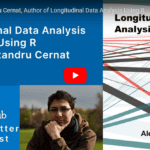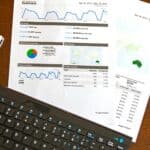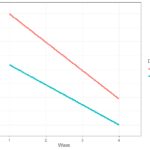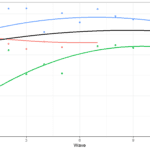I’ve updated the content bellow with the new version of the data that includes more countries! I have also added interactive graphs. Enjoy.
Today I’m going to start a new series on this blog which I call #freesurveydata. The aim is to promote the amazing data that is freely available through high quality surveys around the world. So if I have time I will try to do some basic analyses whenever new data is released. Additionally, I will be using the free software R to make all the analysis and will post all the syntax on Github. I hope this will show how easy it is to use this data. Also, all will be free! You only need a computer to do the same on your own. Let’s start!
One or two days ago the European Value Study (EVS) released their first data based on the 2017 surveys. It includes information from 16 countries and covers very diverse topics like politics, immigration, religion or the environment. The EVS has been collected for a few years now and you can find more info here. Today I’m going to make some simple maps. This is very rich data with lots of countries and waves so do have a closer look at it.
You can access all the syntax I used on Github here. You can freely download the data that I’m using here: https://dbk.gesis.org/dbksearch/sdesc2.asp?no=7500&db=e&doi=10.4232/1.13090
Data citation:
EVS (2018): European Values Study 2017: Integrated Dataset (EVS 2017). GESIS Data Archive, Cologne. ZA7500 Data file Version 2.0.0, doi:10.4232/1.13314
Exploratory analysis of EVS 2017
Politics and voting
Let’s start with some statistics about politics. From EVS it seems that the Nordic countries (Iceland, Sweden and Norway) together with Italy have the highest participation in the local elections while the lowest is in the Baltic countries and Russia.
This is pretty much consistent with the general view about the importance of democracy.
Looking at left-right positioning it seems that Poland, Georgia and Russia are more right-wing while Germany, Spain, Slovenia and Armenia are more left-wing.
General attitudes
Looking at the environment there seems to be a West/East division with Central and Eastern countries supporting more the view that environmental threats are exaggerated compared to West European countries.
Looking at attitudes towards immigrants we see that Iceland respondents are the most positive. On the other hand Czech Republic have the most negative views on the impact of immigrants on the development of the country.
Looking at traditional gender roles we see again a West/East divide. Easter European countries support more the statements “Man’s job is to earn money, woman’s job is to look after the home and family”.
Finally, who are the most satisfied people based on the EVS? Norway, Denmak, Iceland and Switzerland seem the happiest while Russia, Bulgaria, Georgia and Armenia are the least satisfied.
Hope you enjoyed this! Have a closer look at the data and the syntax. Thoughts, ideas, complaints? Write bellow. Want to read more about R? Have a look at: https://www.r-bloggers.com.






Great blog post! A few months ago, I gave a workshop on working with data from GESIS in R for data journalists (materials are available at https://github.com/jobreu/allbus-evs-R-scicar2018). I used ALLBUS and EVS as examples. As data journalists need to visualize the data, I also created choropleth maps with the EVS data using the cartography package (https://cran.r-project.org/web/packages/cartography/index.html). For accessing the GESIS data, I used the extremely help- and useful GESIS package by Eric Persson (https://cran.r-project.org/web/packages/gesis/index.html). I will give a very similar workshop again at the GESIS Data Day for data journalists in January 2019. I already thought about switching to ggplot2 for this new workshop, and your post and code are an excellent inspiration for that (which I will, of course, also reference in the workshop).
Cheers,
Johannes
Thanks for the comment. Teaching journalist how to work with data is a great initiative! I found ggplot to be the most versatile graphics package in R. Also, it keeps developing which is nice. Some nice new extensions are ggplotly and gganimate.
Good luck with the workshop!
Alex